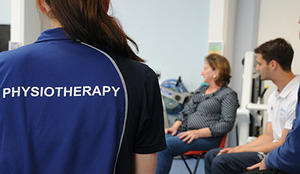A student-led physiotherapy clinic, run at the University of Worcester is changing lives, according to its users.

"This service is just amazing and has had such a positive impact on my life, said Anne Conry.
The clinic is run three times a week at the University's McClelland Centre, based at its City Campus, and provides a safe environment for people living with long-term neurological conditions to pursue gentle exercise and activities that help to keep them mobile.
"I have been using the service for about six months now," said Jimmy Glennon. "I have really seen an improvement in my health as a result; it's been a great benefit to me. It's a really excellent resource. The students and staff are great."
The clinic is run by students on the University's popular Physiotherapy degree, under the careful guidance of well-qualified staff, who are themselves practitioners.
Kat Wood, Neuro-Physiotherapist and Physiotherapy lecturer at the University, said: "There is a gap in the provision of on-going, accessible rehabilitation for individuals living with long-term neurological conditions. The student-led physiotherapy service at the McClelland Centre is one approach in helping to address this. By helping individuals to self-manage their conditions may have further reaching implications in terms of decreased GP appointments, reliance on medication, and hospital admissions, as well as improved social interactions and psychological well-being."
"There is a gap in the provision of on-going, accessible rehabilitation for individuals living with long-term neurological conditions. The student-led physiotherapy service at the McClelland Centre is one approach in helping to address this. By helping individuals to self-manage their conditions may have further reaching implications in terms of decreased GP appointments, reliance on medication, and hospital admissions, as well as improved social interactions and psychological well-being."
The students run two group sessions, on a Monday and Wednesday, each week, as well as private appointments on a Tuesday, and currently have around 20 users regularly using the service. The users are all living with a range of conditions from strokes, Parkinson's, rare genetic conditions affecting their nervous systems, or as the result of accidents.
Many have come via the Worcester-based charity, Headway. Lucy Page, Day Service Manager at Headway, said: "Not only does it encourage and educate people on their health but it also provides a social opportunity for them. Being around others in a similar situation also helps to stimulate confidence.
"There is nothing else like this out there for people living with long-term neurological conditions, which supports them regularly in their health and well-being. We have been very impressed with the service."
Emma Rowland is a second year Physiotherapy student at the University and has been working at the clinic for the last semester.
"It's really lovely to be able to work with the same people each week and watch them make progress," said the 21-year-old. "I had never really thought about neurological physiotherapy before but I can really see myself working in this field now."
Worcester's MP, Robin Walker, visited the clinic recently, after a constituent asked him to see the work going on here and see if the NHS could learn lessons from it.
"The innovative work going on at the University of Worcester is a real model for what works and because it is being conducted in an academic setting where the outcomes are recorded, it will provide a real evidential basis for what might work elsewhere," he said.
 "I am very grateful to the constituent who drew my attention to this matter and will be taking it further both with local commissioners and with a Parliamentary debate. Conditions such as Parkinson's and Stroke can be debilitating and difficult to live with but more people than ever are living with them for longer. By learning from the good work of places like the McClelland Centre and making sure more people are aware of it, we can ensure that more of those people have a better quality of life."
"I am very grateful to the constituent who drew my attention to this matter and will be taking it further both with local commissioners and with a Parliamentary debate. Conditions such as Parkinson's and Stroke can be debilitating and difficult to live with but more people than ever are living with them for longer. By learning from the good work of places like the McClelland Centre and making sure more people are aware of it, we can ensure that more of those people have a better quality of life."
Robin was introduced to the concept of Functional Electrical Stimulation, where assistive technologies, using electrical stimulation, can help people whose nervous system is no longer able to support their muscles to move. He also joined in a session that started with chair based exercises and went on to speak to some of the service users whilst they used the machinery.
"Inclusive activity is a good thing all round," he said. "I have already highlighted some of the brilliant work our university is doing on disability sport and employment but not everyone has the capacity to take part in competitive sport. It was brilliant to see the work going on to support those people for whom even gentle exercise can be a challenge and everyone involved relished that challenge. I know that with an ageing population and more people living with long term conditions there are greater than ever demands on our NHS, but redesigning the way in which we support people so that we can help them to stay healthy is going to be key to meeting those challenges."